Woman Doesn’t Want Her Friend Coming Over With His Adopted Pit Bull Because She Was Attacked By One As A Child, But Doesn’t Know How To Tell Him
How can you tell your friend you don’t like a member of their family and that you don’t want them to bring that member over to your home? Sounds rude, doesn’t it?
And what if the family member is a dog? Well, it doesn’t make things any easier because many dog owners view their pets as family.
One Redditor has a problem – she doesn’t want a dog her friend adopted in her home. Their friend circle comes to her house every weekend, bringing their kids and pets.
She doesn’t have a problem with that because she knows them well. All the dogs have been with their families for years.
Her friend just recently adopted a shelter pit bull, and OP doesn’t know her very well. She has only seen the dog once in her friend’s home, and the dog seemed calm but very protective.
To make matters worse, she was attacked by a pit bull when she was a child.
OP says: “Here's the issue: One of our friends, Matt [33 M], recently adopted a shelter pit bull, Princess, and he's obsessed with her. Before even physically picking her up, he was already excitedly talking about how happy he was that she'd get to come over every weekend and socialize.
I totally get why Matt would think Princess is invited by default, but the problem is I DO NOT WANT HER IN MY HOUSE for several reasons.”
OP asks:

She and her husband have a beautiful home, and it took them years to make it so.

Their friends come over every weekend. Many of them have kids and pets, and OP enjoys having them around.
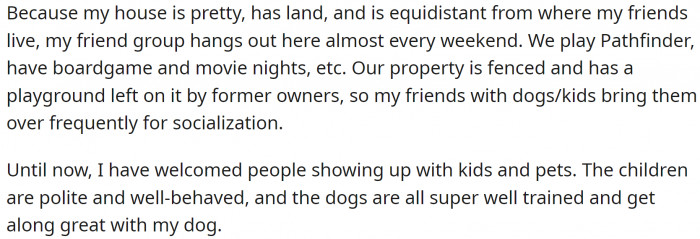
Addressing Past Trauma
Past traumatic experiences can significantly shape our responses to specific situations, especially regarding animals. Research from the University of Virginia highlights how childhood experiences with pets can lead to lasting fears or aversions. In this case, the woman's childhood attack by a pit bull may have created a strong emotional response that influences her current feelings toward dogs of that breed.
But there is a problem. One of her friends got a shelter dog, and OP doesn't like her at all. She is even afraid of her.

OP lists reasons:

The bottom line is she doesn't want her in her home.

Studies published in the Journal of Trauma & Dissociation illustrate how trauma can create hypervigilance and avoidance behaviors in individuals. The woman’s reluctance to allow her friend's pit bull into her home may stem from a subconscious desire to protect herself from a perceived threat, rooted in her past experiences. Recognizing these patterns can help individuals understand their reactions more fully and seek constructive ways to manage them.
OP wonders if she is right here.
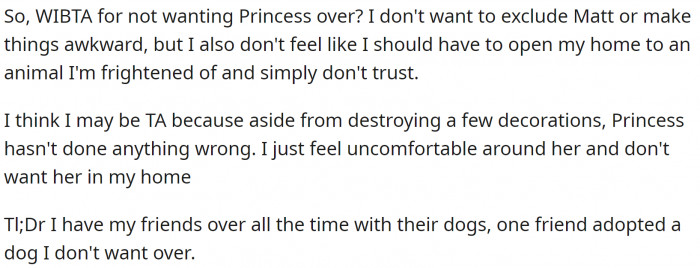
She posted an edit where she says she was attacked by a pit bull when she was a child.

Redditors agree:

Effective Communication Strategies
Communicating one's fears or preferences to friends can be challenging, especially when it involves deeply personal experiences. A clinical psychologist suggests that writing a letter or having a calm conversation can help express feelings without escalating tensions. This approach can allow the woman to articulate her discomfort while still valuing her friendship.
OP says: "
Princess is an adult shelter dog, and I don't know or trust her temperament. There are kids, cats, small dogs, and farm animals at my home. I trust my other friends' dogs because they've had them for YEARS; Princess is brand new.
And that's all her friend needs to know.
The dog breed is not that important - training is.
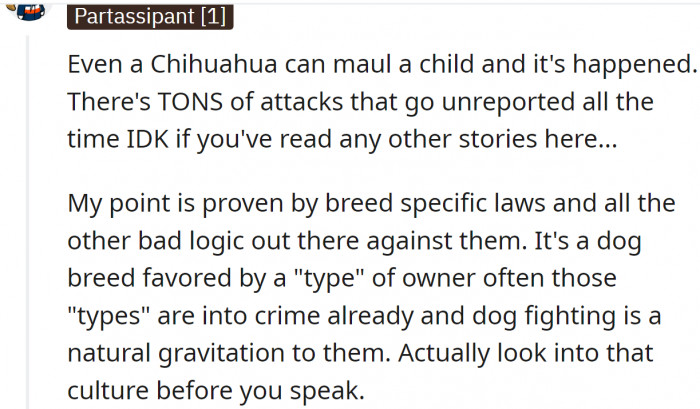
Redditors advised OP what to say:
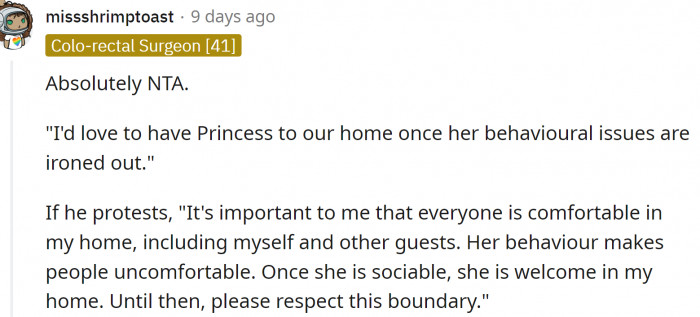
This sounds good:
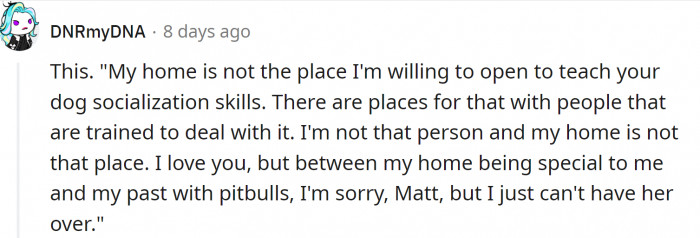
To facilitate understanding, the woman could consider proposing alternative arrangements for visits, such as meeting in a neutral space or outdoors. Research shows that allowing controlled interactions can help mitigate fears and foster positive associations with animals. By framing her concerns in a way that emphasizes her past experiences, she can encourage empathy from her friend while still prioritizing her comfort.
Shelter dogs need time to adjust. Taking them too soon to a crowded, strange home could prove to be disastrous.

OP would be liable for anything that happens to others in her home.
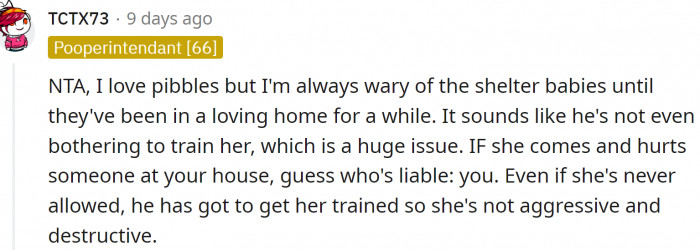
When a new animal is an adult from a breed that is renowned for specific traits, it is especially important to exercise caution around other pets and unfamiliar surroundings. There is a lot at stake if even one negative incident occurs because the canine's past living circumstances are unknown. It's not advised to take an animal who is just getting accustomed to its new life into crowds and unknown territory.
Psychological Analysis
This situation reflects how deep-seated fears from past experiences can impact current relationships and choices. The woman's discomfort around pit bulls may highlight unresolved trauma that requires attention. Engaging in open conversations about her feelings can foster understanding and support from her friends, allowing for healthier interactions.
Analysis generated by AI
Analysis & Alternative Approaches
Understanding the influence of past trauma on current behavior is crucial in navigating relationships involving pets. Open communication and thoughtful arrangements can help individuals address their fears while maintaining important friendships. By acknowledging emotional histories, individuals can find pathways to healing and connection.



